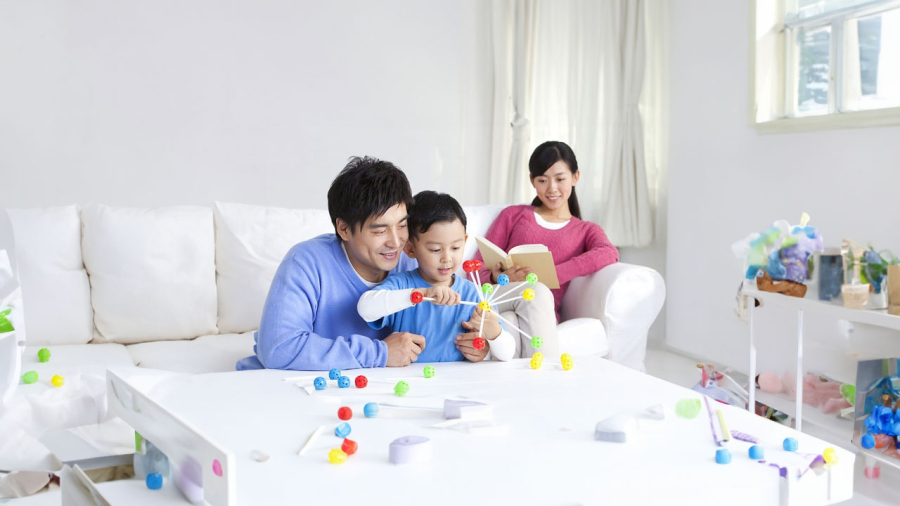Children not only have needs for eating and sleeping but also have a great need for play and physical activities. That is the valuable time for children to explore the world, develop curiosity, and enhance EQ. Playing with young children is particularly important. Through play, children grow up, understand the world, and practice skills, learning communication skills.
Parents are the first ones to play and play persistently with their children. Many busy parents think about making money for their children without realizing the importance of play. It is a precious time that strengthens the family bond and cannot be regained once it passes. Interacting joyfully and playing together also helps strengthen the relationship between parents and children.

Playing with children requires skills and energy. Many people play with children but get tired because they can’t keep up. Many people play without interest. If parents can do the following things after playing with their children, they will help their children develop a lot:
Be interested in playing with your child with concentration
When you are focused, the joy of playing will be different than when you are absent-minded. If you play and distract at the same time, the child will not feel the connection. Children have a higher ability to absorb information and learn than adults think. Therefore, arrange your time to play with your child by putting your phone away, focusing entirely on them. That is teaching them to concentrate and is a gift to them. Your focused play will help children develop more and discover better.
Focus on doing things together
The toy or game you are using is not as important as the action of playing together. In fact, expensive and complex toys are often not better than simple toys or objects and sometimes even hinder children’s play. Children do not focus on material things, they need excitement and when they are excited, they are very concentrated. Playing with your child is a great opportunity to step into their world. So if you are absent-minded, you will miss the opportunity to bond and understand your child. Your child will also not feel your enthusiasm when you are absent-minded.

Have a conversation
While playing with your child, talk to them as much as possible. Stimulate their curiosity with questions, elicit their thoughts, let them explore and describe what they are doing or seeing. The way you play is the way you help their brain open up through games. This is very important because during the process of interacting with parents, children learn how to listen and learn language, even when they cannot speak yet. It also shows that you care about what they are doing. This helps build their confidence.
Take the time to follow the child
What is familiar to us can be very new and strange to children, and they may want to play at a different pace or in a different way. So don’t treat children with our old ways. Slow down and let your child lead, and show excitement, explore new things every time like the first time.
Spend the most time playing with your child
Instead of spending a lot of time playing with your phone while your child plays alone, play with your child. Playing with your child helps them interact better, brings happiness and bonds them together, and helps you understand your child. It doesn’t have to be learning this or that to be good. Playing is a way for children to grow up.
Let your child play outdoors more
If you can arrange time, go outside and play with your child as much as possible. Outdoor spaces help children develop both physically and mentally. Playing outdoors helps children explore nature and improve visual perception better than indoors. Playing outdoors helps children be healthier and explore the world more. Outdoor spaces also bring new emotions to children.
Play more diverse games
Instead of playing the same game every day, play more diverse games with your child, from playing with toys, self-creating games, reading books, playing with tools, etc. The more diverse the games, the more interesting they are, helping children explore more and you understand your child better, allowing your child to learn more.
Learning Tips for Parents: 12 Japanese Techniques to Use with Your Children
Discover the 12 principles of teaching children in the traditional Japanese way that parents can learn with Dien May XANH! By instilling these principles when your children are young, you can ensure that they grow up to be obedient, smart and polite, the hallmarks of a successful education in Japan.
Mothers’ Need for Awareness of Dual Activity of Breastfeeding and Watching TV
In the contemporary world, in which technology pervades our lives, some mothers tend to soothe their babies through nursing while simultaneously watching television. Although this practice may not appear to affect the infant, studies show that it can in fact have dire repercussions on the baby’s well-being, both in terms of physical health and mental growth. In this article, we will look at the possible reasons for this activity and its potential outcomes.


































